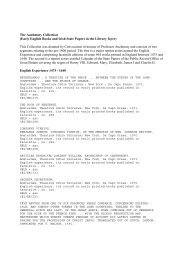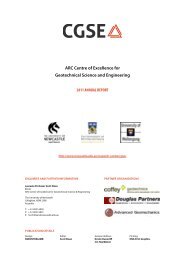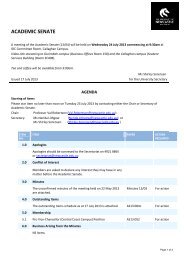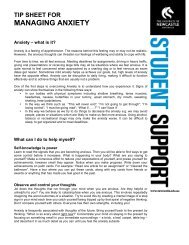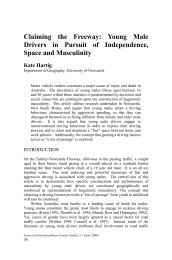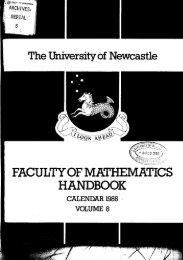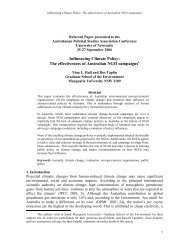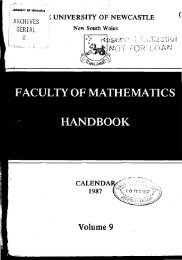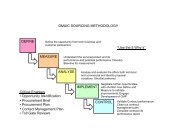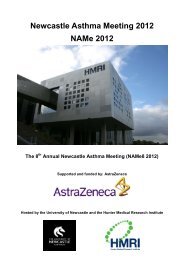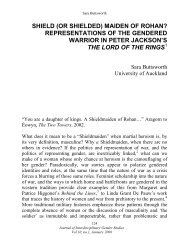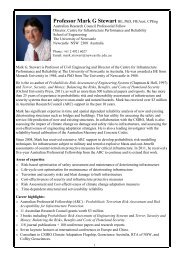n - University of Newcastle
n - University of Newcastle
n - University of Newcastle
You also want an ePaper? Increase the reach of your titles
YUMPU automatically turns print PDFs into web optimized ePapers that Google loves.
AN AUSTRALIAN LAXGUAGE.<br />
WINTA 4.-PART 4.<br />
Section 9.<br />
Tulo a, ' straight,' opposed to crooked'; 'upright' as to sharacter ;<br />
'truth' as to expression, opposed to falsehood ; tuloa kan ta,<br />
' one who is straight, upright, true.'<br />
Moron, 'life,' opposed to death ; animal, not vegetable, life.<br />
Kakilli-kan ta, 'it is one who remains, who IS, who exists';<br />
kakilli from kakilliko, 'to be' in some state.<br />
Kaumal, 'great'; piriwal kauwil, 'lord or king.' lit.. 'great<br />
chief ' ; kauwal- kauw 81, ' great-great,' ' very great.'<br />
Tanti katai kakilliko, 'thus to be always,' 'to be for ever.'<br />
Pulul-pulul, ' trembling, shaking.' Kan~n, ' will be.'<br />
Bukka, ' wrath, rage, fury '; bukka tin, 'on account <strong>of</strong> wrath'.<br />
gikoumba tin 'on account <strong>of</strong> his.'<br />
Kovra, ' a floe6 herd, an assembly, a mob, a nation'; y antin<br />
b ar a lr onara, ' all they, the assemblies <strong>of</strong>. nations.'<br />
Niuwarin, thecausativecase <strong>of</strong> niuwara, 'anger'; niuwarin,<br />
'because <strong>of</strong> anger'; 'from or on account <strong>of</strong> anger,' as a cause.<br />
Section 10.<br />
Bapai,,' nigh at hand, close to '; bapai ta ba, ' it is nigh to.'<br />
--.<br />
Section 11.<br />
Wiy an, the present tense <strong>of</strong> wiyellilio, ' to communicate by<br />
sound, to speak, tell, say, call out '; yantinko wiyan bon ba,<br />
' all when they call on him.' The verbalizing particle, ba, is<br />
equivalent to ' when,' or ' at the time when ' the verbal act or<br />
state shall be or mas, according to the tense <strong>of</strong> the verb.<br />
Ralog, 'afar <strong>of</strong>f, distant.'<br />
Eakillin, ' continues to be,' 'is now being'; the present participle<br />
<strong>of</strong> the verb knlcilliko, 'to be ' in some state.<br />
Bar un kai, ' from, on account <strong>of</strong> them,' sc., persons.<br />
Tarakai tin, ' from, on account <strong>of</strong> the evil,' sc., thing.<br />
Section 12.<br />
Wirrilli ; hence wirrilli ko, ' to wind up as a ball <strong>of</strong> string.'<br />
The blacks do this to their long fishing-lines, and opossum-fur<br />
cords, to take care <strong>of</strong> them, to preserve them ; hence the verb<br />
means ' to take care <strong>of</strong>, to preserve, to keep together, to guide,'<br />
as a flock <strong>of</strong> sheep ; mirrilli-kan, ' one who takes care <strong>of</strong>' by<br />
some act <strong>of</strong> locomotion, as a watchman going his round.<br />
Mirral, 'desert, desolate, miserable'; 'a state <strong>of</strong> want '; mirral<br />
ta unni, 'this is a desert place'; mirril-lag unni, ' this irr<br />
desolate or miserable,' because in a desert there is nothing to<br />
eat or drink; mirral kitan, 'is now at present in a miserable<br />
or desolate state, in a state <strong>of</strong> want '; keawgi, 'not to be.'<br />
Keawai mal, ' certainly shall not be '; equivalent therefore to<br />
' shall not' ; mirral kanun, 'shall be in want.'<br />
. SELECTIONS FBOM THE SCRIPTURES.<br />
2 13<br />
Section 13.<br />
Gurrara-kan, ' one who personally attends to '; gurrjrakarl<br />
liauail, ' one who is very pitiful.'<br />
Gurrira-mulli-kan, 'one who causes or exercises attention,'<br />
'one who does attend to'; the phrase means ' he is a merciful<br />
MINTA 5.-PART 5.<br />
Section 1.<br />
Goro, 'three'; see page 108.<br />
Kabilli, 'state <strong>of</strong> being'; hence kakilliko, ' to be, to exist' in<br />
some state ; we cannot express 'is dead ' by tet t i ka tan,<br />
because ka t an implies existence, though we may say nloron<br />
katan, 'is alive,' because existence is implied; 'is dead ' must<br />
be te t ti ka ba, which means ' is in the state <strong>of</strong> the dead ';<br />
generally the blacks say kulmon, 'stiff, rigid' for ' deacl':<br />
thus t et ti k a b a k u lw o n is equivalent to 'dead and stiff ,'<br />
in opposition to 'a swoon,' which might be the meaning,<br />
unless circumsta,nces led to another conclusion.<br />
Wokka, an adverb, ' up,' opposed to bara, ' down '; wokka<br />
TZiFaam.oro k o ka b a, ' sre up in heaven.'<br />
ne who speaks it is' ; this is the Grn<br />
pplied to a person; to a thing, it would<br />
it is,' in opposition to corporeal substance;<br />
' the bsddy,' and mamuya is ' a ghost "<br />
word for ' the body.'<br />
ot to be regarded but<br />
cs ' one TV~O acts sacredly,'<br />
ge <strong>of</strong> being held sacred or<br />
ds, a pig devoted to the<br />
god Oro, in former times, mas made sacred by having a red<br />
feather thrust through and fastened to its ear, and thus the<br />
reverend pig was privileged to feed anywhere unmolested, as<br />
being sacred ; nor was he confined to a tithe <strong>of</strong> the produce if<br />
he broke through into any plantation, but xras permitted to eat<br />
his fill, not, however, without a murmur at the sacred intru-<br />
object; gali, 'this,' as agent; unni<br />
e threeit is'; makil bo ta, 'oneitis,



